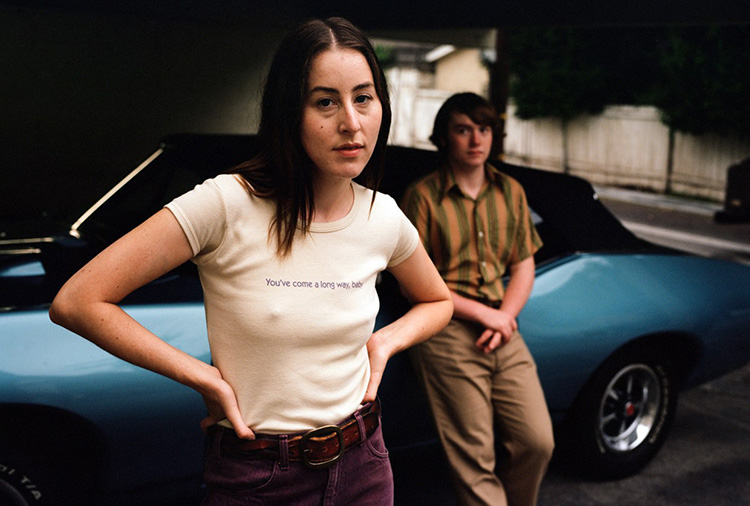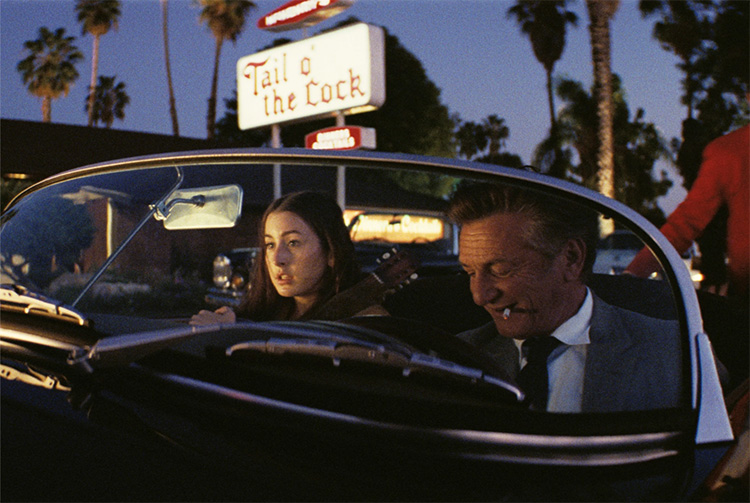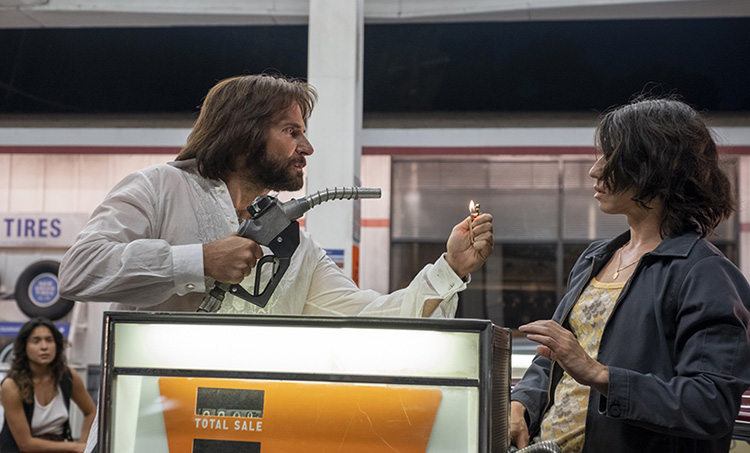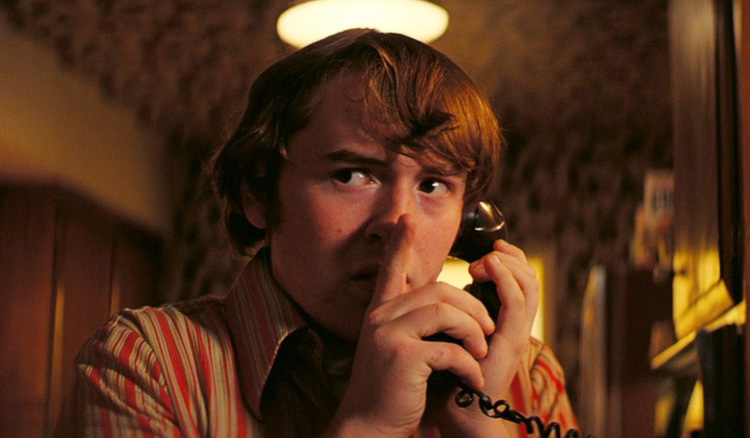ENTER YOUR EMAIL TO RECEIVE OUR WEEKLY NEWSLETTER
Boy Wonder at Mid-Career
Paul Thomas Anderson’s rollicking, serious, endearing Licorice Pizza is well worth a trip to a movie theater. It’s an eccentric take on the Hollywood rom-com.
By George Blecher

Alana Haim in her first film role. She’s been called a breakout movie star—but not with your usual movie-star face. (Photos: Metro-Goldwyn-Mayer Pictures)
. . . . . . . . . . . . .
JANUARY 19, 2022
Among the rush of films released under the wire for this year’s Academy Awards is a new comedy by Paul Thomas Anderson, one of the few Hollywood directors who seems to have the freedom to make the films he actually wants to make. Though his latest, oddly titled Licorice Pizza (named after a chain of 1970s California long-playing record stores—note the acronym), has been getting positive reviews along with reasonable theater crowds, it is both a more confusing and serious film than the goodtime-y reviews would suggest.
Anderson’s first three films—Hard Eight (1996), Boogie Nights (1997), Magnolia (1999)—came in just four years, and it was obvious the young Californian could create film-worlds (especially the underbelly of the Hollywood film industry), write penetrating, engaging dialogue, and draw unexpectedly touching performances from familiar actors (notably Tom Cruise’s Academy-Award-nominated life coach in Magnolia).
Later, Anderson seemed to go off on a tangent. His next films—among them There Will Be Blood (2007), The Master (2012), Phantom Thread (2017)—centered around driven, domineering men whose outsize presence filled the screen with a combination of energy and bombast. They felt like film versions of Theodore Dreiser novels—ponderous meditations on how Power energizes and destroys. What exactly was Anderson getting at? The fun and surprise of his early films were lost.
Now with Licorice Pizza, Anderson returns to more familiar territory—the pastel middle-class-ness of the 1970s San Fernando Valley, the mega-suburbs of countless Valley Girl TV sitcoms. Except for the oddly matched, credibility-straining principals—Cooper Hoffman (son of the late Philip Seymour Hoffman) as a 15-year-old boy improbably pursuing a 25-year-old girl, played by singer Alana Haim (both Hoffman and Haim are in their first film roles)—Licorice Pizza appears to be the usual boy-meets-girl story we’ve seen a million times. Episodic, filled with a lot of running (which seems at times to substitute for dialogue that would help us better understand the characters), it follows a standard pattern of rejection and reunion until the couple literally runs into each other’s arms. The film feels more like a Hollywood romance of the 1950s than of the 2020s, though it takes place in the ’70s—almost as a fable of that decade.
But it isn’t. Not quite. What makes Licorice Pizza compelling and carries it forward (aside from all the running) are the detours it takes from its own formula. If nothing else, they reflect the ambivalence of an aging boy wonder who hasn’t quite found the synergy between auteur and entertainer.

That’s Sean Penn, in a cameo role, with Alana Haim, outside the old Billingsley’s Restaurant at the Van Nuys Golf Course. Billingsley’s is masquerading as the defunct prime ribs and cocktail joint Tail o’ the Cock.
. . . . . . . . . . . .
Harkening back to the cameo roles of his earliest films, Anderson casts Sean Penn as a B grade Hollywood actor, complete with mustache, Brylcreemed hair and sharkskin suit, who’d rather jump a motorcycle over a bonfire than complete a seduction. Bradley Cooper plays the wildly flamboyant hairdresser Jon Peters, who brags about his famous girlfriend, Barbra Streisand, threatens to kill everyone in sight, and smashes store windows when he doesn’t know what else to do with his energy. And, most alarmingly, film director Benny Safdie plays the real-life Congressman Joel Sachs, whose liberal facade masks a personal coldness in publicly denying his gay lover. Operatic in their extravagance, these scenes are sometimes comic, often ominous: as virtually the only adults in the film, the solipsistic characters in these narrative asides inhabit a world outside the confines of childhood that seems treacherous and hostile.

Another cameo role: Bradley Cooper playing Hollywood hairstylist Jon Peters (famous for being Barbra Streisand’s boyfriend) in hyped-up mode, threatening a passerby with a gas explosion.
. . . . . . . . . . . .
There’s also a curiously informal, home-movie, even sloppy quality to the film, which is brought about in part by the fact that Anderson uses as principal actors people who are virtually family. According to press releases and interviews, he’s known Cooper Hoffman since he was a baby and has worked with Alana Haim in several videos; Haim’s mother was reportedly Anderson’s music teacher, and her whole family has speaking parts in the film. One senses that Anderson has gathered this extended family around him in order to create a safe atmosphere in which he can play with ideas of what real intimacy may consist of—not sex, not even consensus, but toleration of differences.
The major eccentricities in the film are in Anderson’s central characters. Hoffman’s teenage Gary Valentine is a driven young man. Chubby, good-humored, impish, he’s never even shown in school; instead, he runs furiously from his roles as a child sitcom actor to being a water bed salesman to owning a pinball parlor, though it’s never clear where he gets the start-up funding for his businesses.

The teenage Cooper Hoffman. Like Haim’s, this is his first film role.
. . . . . . . . . . . .
His entrepreneurial drive, which ultimately wins the heart of the more introverted Alana Kane, is the central value of the film, and carries everything before it. Anderson has tapped into this hunger before: it’s what drove Tom Cruise’s character in Magnolia, Daniel Day Lewis’s in There Will Be Blood, even Philip Seymour Hoffman’s in The Master. In those films, Anderson seemed torn between admiring his protagonists’ maniacal energy and being repelled by it; after all, it destroyed people, including the protagonists themselves.
The leavening element here—and a possible indication of where Anderson’s future films may take him—is the brooding, self-questioning character played by Alana Haim. It seems to me this is the first time Anderson has focused on a female figure as central character—and certainly such an eccentric one. (One wonders whether the passionate Jewishness she expresses in one striking sequence isn’t a reflection of Anderson’s own wish for passionate commitment.)
Haim doesn’t have a movie-star face. Harriet Sansom Harris, playing a casting agent in the film, observes, “You’ve got a Jewish nose. A very Jewish nose. I can see there’s a fighter inside you.”
There is indeed. Though she hasn’t a clue what to do with her life, Haim’s character is always questioning. She questions her suitor about why he’s pursuing her and why he obsesses about money, and she questions herself about why she likes him. Her discomfort as she swings unpredictably, dangerously, from one emotion to another suggests that Hoffman’s American entrepreneurialism has a jarring, bullying element in it, that it confuses and attracts in equal measure—and that this complexity must be addressed. Ultimately it’s her refusal to take anything at face value that makes Licorice Pizza deeper than a Hollywood rom-com—a study of how youthful self-questioning may be the only protection against growing up into fools, or something far worse.
George Blecher writes for The New York Times and for a number of European publications about American politics and culture. This year, he is a fellow at the CUNY Graduate Center’s Writers’ Institute. See georgeblecher.com











